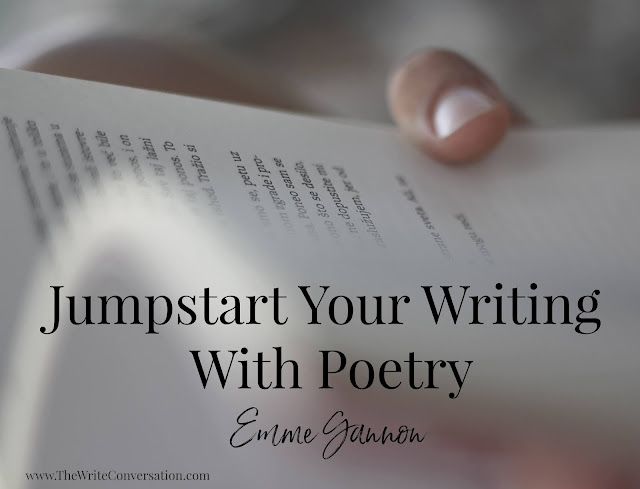by Emme Gannon @GannonEmme
The late Pat Conroy tells us in his book, My Reading Life, that he began each writing day with a poem that would, “unloose the avalanche of words inside me, that secret ore that, once polished, will sit before me disguised as the earth’s jewelry.”
Just reading Mr. Conroy’s description creates a desire to unlock the secrets that pour from the poet’s soul—secrets of the heart that have the power to break through that undiscovered place inside of us and release words and feelings that have been yearning to be heard.
Poetry is the language of the heart, often a story of the evolution of change in the soul of the poet. One of my favorite poems is Sonnets From The Portuguese by Elizabeth Barrett Browning (1806-1861.) Her forty-four sonnets focus on her love for her husband, Robert Browning.
Elizabeth was a sickly woman who believed she would never marry and who was surprised by the love of Robert Browning. In the beginning of the poem, she expresses her feelings of despair as she lives with the belief that she will not live a long and happy life because of her ill health. She laments that she is not deserving of so great a love as Robert. The poem soon shifts from despair to euphoria as she allows herself to be embraced by Robert’s love and the realization that, as a child of God, she is worthy of his love. The force of this revelation flows through her being, thus revolutionizing her feelings of unworthiness to that of a worthy recipient. By the end of the sonnet, she is captured by love—a love so deep that the force of it embraces her with such intensity that thoughts of love, not death, becomes her constant companion.
Elizabeth wrote the poem as a gift for her husband. His nickname for her was “The Portuguese,” hence the title. She begins Sonnet I by looking back to the ancient Greek poet Theocritus, noting that poems were sung, not recited. She then offers her heart in this, the first of her sonnets:
I thought once how Theocritus had sung
Of the sweet years, the dear and wished-for years,
Who each one in a gracious hand appears
To bear a gift for mortals, old or young;
And, as I mused it in his antique tongue,
I saw, in gradual vision through my tears,
The sweet, sad years, the melancholy years,
Those of my own life, who by turns had flung
A shadow across me. Straightway I was ‘ware,
So weeping, how a mystic Shape did move
Behind me, and drew me backward by the hair;
And a voice said in mastery, while I strove,
‘Guess now who holds thee?’—‘Death,’ I said, But, there
The silver answer rang, ‘Not Death, but Love.’
By Sonnet 43, Elizabeth’s words had crescendoed into one of the world’s most famous and beloved sonnets:
How do I love thee? Let me count the ways.
I love thee to the depth and breadth and height
My soul can reach, when feeling out of sight
For the ends of Being and ideal Grace.
I love thee to the level of everyday’s
Most quiet need, by sun and candle-light.
I love thee freely, as men strive for Right;
I love thee purely, as they turn from Praise.
I love thee with the passion put to use
In my old griefs, and with my childhood’s faith.
I love thee with a love I seemed to lose
With my lost saints, I love thee with the breath,
Smiles, tears, of all my life! And, if God choose,
I shall but love thee better after death.
The passion of her heart was exposed and passed on, first to her beloved husband, and then to the world. She looked deep into her hurting soul, saw God, and then was able to love with such intensity because He became the filter through which she interpreted love. Oh, the beauty such words hold—beauty that has the potential to attach itself to each of us.
The late Pat Conroy referred to poetry as jewels that he would use to jumpstart his writing. An apt description, for as we sit alone at our writing desk, the poet’s words heighten our sense of wonder—that strange and wonderful emotion that catapults our senses and creates perfect jewels that have the ability to release hidden words and bring a deeper dimension to our writing.
Elizabeth ends her sonnets with these words:
Instruct thine eyes to keep their colors true.
And tell thy soul their roots are left in mine.
It’s as if she is challenging us to see truth in poetry and let its beauty dig deep so as to reveal what is waiting to be discovered.
TWEETABLE


Thank you for your inspiring post, Emme.
ReplyDeleteI always feel humbled when my words inspire. Thank you for your comments, Mary Ann.
DeleteI echo MaryAnn and am reminded of the links books provide across the miles and ages to connect one person to another. Conroy's book My Reading life is one of my favorites. It was a delight to discover you have read it too. blessings, Ann
ReplyDeleteYes,Ann,Pat Conroy's, My Reading Life, inspired me in so many ways. It's one of those books that we always keep in ready reach. Blessings to you.
DeleteAh, poetry, to be sure it is the language of the soul. Blessings to you. ;) Donevy
ReplyDeletePoetry is indeed the language of the soul. I always feel inspired. That you for your response. Blessings.
DeleteWriting poetry is my panacea when overwhelming things happen. Although I had read Elizabeth Barrett Browning's poetry in high school, I never saw the beauty of it until reading it this time. Thanks!
ReplyDeleteI agree, Roberta. Writing poetry releases a special part of ourselves. Keep writing. Thank you for your comments. Blessings.
DeleteI write poetry when I'm deeply reflective.
ReplyDeleteSuch a good way to pull out our thoughts and dreams. Blessings, DiAnn, and keep writing.
ReplyDeleteBeautiful! Thank you for the background on Elizabeth's poem.
ReplyDelete